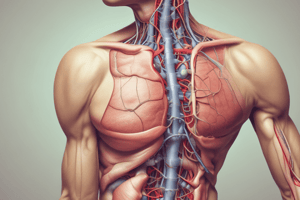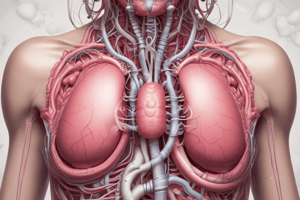Podcast
Questions and Answers
What is the main function of the heart?
What is the main function of the heart?
- Exchanges oxygen and carbon dioxide
- Filters waste from the blood
- Pumps blood throughout the body (correct)
- Produces bile
What is the main control center of the nervous system?
What is the main control center of the nervous system?
brain
What is the role of the kidney?
What is the role of the kidney?
Filters waste from the blood
What does the liver produce?
What does the liver produce?
What are the main organs of the respiratory system?
What are the main organs of the respiratory system?
What is the function of the stomach?
What is the function of the stomach?
What is another name for the large intestine?
What is another name for the large intestine?
What are the two main roles of the pancreas?
What are the two main roles of the pancreas?
What is the largest organ of the human body?
What is the largest organ of the human body?
What is the function of the bladder?
What is the function of the bladder?
What does the spleen do?
What does the spleen do?
Where does most chemical digestion and absorption of food take place?
Where does most chemical digestion and absorption of food take place?
What is the role of the gallbladder?
What is the role of the gallbladder?
Flashcards are hidden until you start studying
Study Notes
Cardiovascular System
- Heart: Hollow, muscular organ responsible for pumping blood throughout the body.
Nervous System
- Brain: Mass of nerve tissue serving as the main control center of the nervous system.
Renal System
- Kidney: Filters blood to remove waste products such as urea, water, salt, and proteins.
Digestive System
- Liver: Produces bile, essential for digestion and fat absorption.
- Stomach: Muscular elastic sac that stores food, breaks it down mechanically, and initiates chemical digestion of proteins and fats.
- Colon (Large Intestine): Final part of the digestive system, involved in water absorption and waste processing.
- Small Intestine: Primary site for chemical digestion and nutrient absorption.
Endocrine System
- Pancreas: Functions in both exocrine (producing digestive enzymes and bicarbonate) and endocrine (secreting insulin and glucagon) roles to regulate blood glucose levels.
Respiratory System
- Lung: Main organs responsible for exchanging oxygen and carbon dioxide in air-breathing vertebrates.
Urinary System
- Bladder: Elastic, hollow organ that serves as temporary storage for urine.
Immune and Blood Systems
- Spleen: Organ that produces, stores, and eliminates blood cells, playing a role in immune response.
Integumentary System
- Human Skin: The largest organ of the body, comprised of all four tissue types, serving as a protective barrier and playing various roles in sensation and temperature regulation.
Accessory Organs
- Gallbladder: Muscular sac connected to the liver responsible for storing and secreting bile for digestion.
Studying That Suits You
Use AI to generate personalized quizzes and flashcards to suit your learning preferences.




